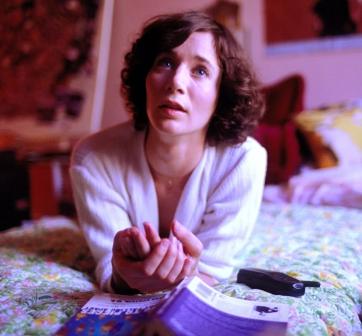 So, in keeping with my usual Independence Day and unBirthday ritual of going to the movies (My b-day is December 29, my brother‘s is January 2 — as these dates fall uncomfortably close to Christmas, we received our birthday gifts on July 4th when I was a kid — whether or not this personal validation on America’s birthday every year played a part in my pursuing a career in US history is still an open question), I went to check out the exceedingly well-reviewed Me and You and Everyone We Know, written, directed, and starring performance artist Miranda July, at the new IFC Center (a.k.a. the old Waverly, where I lost my keys during Apollo 13 a decade ago.) And? Well, July definitely has an original and distinctive voice, and I can see why some critics loved this film. But, frankly, her voice is also one that didn’t speak to me very much. Me and You deserves credit for its sunny disposition and dogged faith in people, I suppose, but frankly, after ninety minutes I found the whole enterprise a bit stilted and twee.
So, in keeping with my usual Independence Day and unBirthday ritual of going to the movies (My b-day is December 29, my brother‘s is January 2 — as these dates fall uncomfortably close to Christmas, we received our birthday gifts on July 4th when I was a kid — whether or not this personal validation on America’s birthday every year played a part in my pursuing a career in US history is still an open question), I went to check out the exceedingly well-reviewed Me and You and Everyone We Know, written, directed, and starring performance artist Miranda July, at the new IFC Center (a.k.a. the old Waverly, where I lost my keys during Apollo 13 a decade ago.) And? Well, July definitely has an original and distinctive voice, and I can see why some critics loved this film. But, frankly, her voice is also one that didn’t speak to me very much. Me and You deserves credit for its sunny disposition and dogged faith in people, I suppose, but frankly, after ninety minutes I found the whole enterprise a bit stilted and twee.
So the upshot is this…Miranda July is a struggling video artist who one day decides she’ll be smitten with John Hawkes (Deadwood‘s Sol Starr), a soon-to-be-divorced shoe salesman who tries (and fails) to connect with his distant kids Peter and Robby (Miles Thompson and Brandon Ratcliff) through ill-thought-out stunts such as lighting his hand on fire. I came in figuring that this July-Hawkes romance was the centerpiece of the film, and I was basically in for a smart, indy-inclined romantic comedy. But, in fact, Me and You spends as much or more time with Everyone They Know, from Hawkes’ creepy, pedophile-in-training partner in the shoe department to two sexually adventurous teenage classmates of Peter’s to the little girl next door, who has developed a slightly disturbing penchant of collecting a “dowry” of home appliances in her hope chest.
If this is starting to sound like a Todd Solondz movie, well we’re in the same ballpark. But, unlike the relentlessly dark and downbeat Solondz, July’s universe is a much shinier, happier place, where (in one of the more affecting scenes in the film) even a lowly and abandoned goldfish is loved by many and doted on in its final moments. And, at times, July’s “bright-side-of-life” vision was truly transporting, as when Hawkes is distracted from the final collapse of his marriage by the sight of a bird alighting outside. (“Banish all dismay, extinguish every sorrow. If I’m lost or I’m forgiven, the birds will still be singing.“)
 Whatsmore, what seems to be July’s wider theme is an intriguing one — we live in a world where me, you, and everyone we know are likely more comfortable communicating by keyboards, cellphones, photographs, video, or other interpolating media than we are by simple voice or touch. After awhile, though, I confess I found myself pining for something more akin to Solondz’s trademark misanthropy. Despite nice moments scattered here and there, I found too much of this film precious and quirky for its own sake, and it began to feel less like a movie than a series of video art vignettes at the Whitney. Take it with a grain of salt — again, I could see this movie being more appealing to warmer, gentler, and less cynical souls…but, as for myself, I have to admit I had emotionally checked out by the last reel.
Whatsmore, what seems to be July’s wider theme is an intriguing one — we live in a world where me, you, and everyone we know are likely more comfortable communicating by keyboards, cellphones, photographs, video, or other interpolating media than we are by simple voice or touch. After awhile, though, I confess I found myself pining for something more akin to Solondz’s trademark misanthropy. Despite nice moments scattered here and there, I found too much of this film precious and quirky for its own sake, and it began to feel less like a movie than a series of video art vignettes at the Whitney. Take it with a grain of salt — again, I could see this movie being more appealing to warmer, gentler, and less cynical souls…but, as for myself, I have to admit I had emotionally checked out by the last reel.
